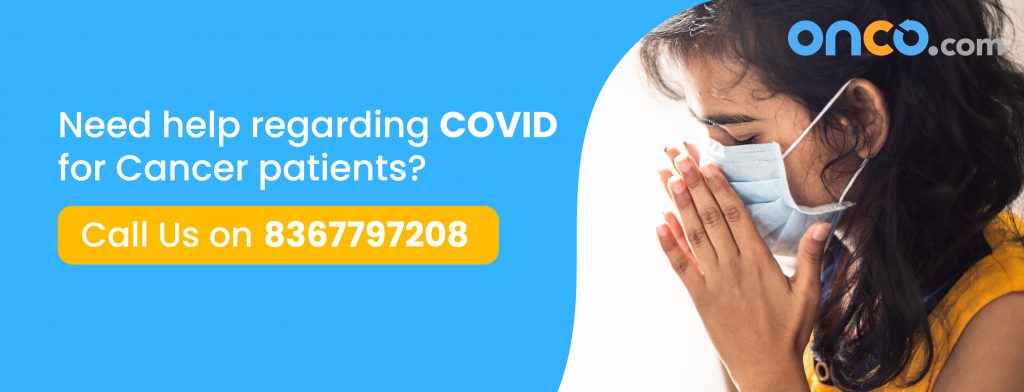Dr Dodul Mondal is a Senior Consultant Radiation Oncologist at Indraprastha Apollo Hospitals, New Delhi, and has trained at AIIMS, Delhi, Cancer Institute of New Jersey, USA. Over the last decade, Dr. Mondal has amassed comprehensive knowledge and immense experience treating malignancies such as breast cancer, gastrointestinal cancer, genitourinary cancer, head and neck cancer, pediatric and hematologic Malignancies, gynecologic malignancies and brain tumours. In this article, he discusses the impact of COVID-19 on treatment decisions in brain tumours.
The world has been rattled by the ongoing Coronavirus infection (COVID19) which started from the city of Wuhan, China somewhere in late 2019. By this time, more than twenty lakh people worldwide are infected causing more than one lakh deaths involving more than two hundred countries. Whereas the United States is currently the most affected country both in terms of the number of cases and the number of deaths, India is also waiting to know its fate in the long run and so far, well-controlled.
In 2018, WHO estimated almost 9.6 million deaths worldwide due to cancer (almost 1 in every 6 deaths). Many of these cancers require immediate attention and treatment. Delay in treatment is known to jeopardize treatment outcomes in most situations.
When the entire world is busy fighting the highly contagious virus infection, cancer patients are finding it difficult to understand and respond to this situation adequately. Even oncologists across the globe are in a fix due to a lack of data on coronavirus infection and its implication on cancer patients. Which is more important? To treat or not to treat? How to treat? Which cancer is safer to wait for? Which cancer is dangerous to wait? Many questions are there without having any single answer. Cancer specific data in COVID patients or vice versa are very less at present. Only one Chinese data with roughly 2000 patients from 575 hospitals across 31 provinces is available to us so far. They identified 18 patients with history of cancer. This rate is higher than their usual national cancer occurrence pattern suggesting slightly higher risk of cancer in patients being affected with coronavirus infection. Also, patients with cancer had more severe events. However, eighteen is too small a number to draw any conclusion. Another fact was most of the patients were having lung cancer. Specific data are lacking pertaining to brain tumour at this moment.
Here are, some useful discussion out of common understanding and basic principles of infection and cancer care coupled with excerpts of available evidence so far in this situation on brain tumours.
Overall precautions to be taken by brain tumour patients undergoing treatment right now:
Let me put it in this way, all patients coming to hospital need almost same basic precautions. A useful summary can be outlined this way:
- Some general precautions:
-
-
- Everyone including the patients should wash your hands often with soap water for atleast 20 seconds. Do this as many times as possible,
- you can use alcohol-based hand rub instead (at least 60-70% alcohol concentration).
- Cough into your elbow or use a tissue when coughing or sneezing.
- Do not touch your mouth, nose, eyes unnecessarily. You can use a goggle to protect your eyes.
- Maintain Physical distancing of at least 1-2 meters.
- Protect your face by covering with mask.
- Use your personal transport if possible. Sanitize doorknob, steering wheel, and other surfaces where you can potentially touch during your travel.
- If you are compelled to use public transport, try to maintain physical distance as much as possible. Stay away from people having signs of respiratory or flu like symptoms like cough, sneezing etc.
- Follow the guidelines laid down by your hospital. Ask for the same if you are not aware of it.
- Change your dress immediately after reaching home. Keep them in a safe place not to be touched by others for five or six hours before washing with soap or detergent. If possible, use one set of cloth for one day.
- Maintain shoe hygiene. use separate pair for outside use.
- Sanitize the places at home where people touch very commonly like calling bell, doorknob etc.
- If you are an in-patient admitted in cancer ward, ask your health care provider to follow hand hygiene and other protective steps properly.
-
It needs special mentioning that, none of the precautions including use of colony stimulating factor are proven to prevent or mitigate corona virus infection or its consequences.
Stage-wise guidance for brain tumour treatment during COVID-19 pandemic.
Traditionally brain tumours are not staged in a classical manner like other cancers. Brain tumours are classified either as benign or malignant. Malignant tumours are again divided as per their pathological grades into high grade or low grade and so on.
Let us make it simple. COVID19 has not changed management protocol of brain tumours yet. If this continues, there might be some guidelines pouring in from large bodies like ASTRO/ESTRO/ASCO for brain tumour patients as well.
It may be justified to discuss with your team of doctors (including radiation oncologist, neurosurgeon, and/or medical oncologist to understand gravity of your condition, standard of care for your type of tumour, whether alternatives are available with equal efficacy or not etc.
Let me give an example, you can discuss options of radiosurgery instead of surgical removal of tumour to reduce your hospital stay. However, radiosurgery is not “magic treatment” for all brain tumours. It can be done only for some very selective conditions like AVM (arteriovenous malformation), pituitary adenoma, craniopharyngioma, small limited number of metastatic lesions, meningioma, schwannoma etc.
Who can postpone treatment for brain tumour? If yes, then for how long can we delay further treatment?
It is important to understand that there is no “one size fits all” concept in cancer care. Every patient is different from the other in terms of their tumour, its behaviour, necessary treatment, potential side effects, necessity of supportive care and so on. It is important to identify individual need and customize treatment in a personalized approach.
Although it is not justified to answer in a single word, following examples can help in deciding the immediate necessity of treatment.
Example 1: Mr X has been incidentally diagnosed with a meningioma without any significant problem and does not have immediate risk of neurological complication. Perhaps, he can wait after discussing with his team of doctors.
Example 2: Mr X has been diagnosed with a meningioma with significant neurological problem (like raised intracranial tension, progressive and rapid loss of vision, impending visual loss, impending spinal cord compression etc.). For him it would be necessary to seek for immediate medical attention and he should not wait for COVID situation to become normal.
Example 3: Ms Y has been diagnosed with suspected highgrade glioma. It is justified and necessary to seek immediate medical attention and proceed for further treatment. The patient, family members and treating hospital must take all necessary precautions to avoid risk of infection.
Example 4: Baby Z has been diagnosed to have suspected medulloblastoma after initial evaluation for her vomiting, loss of balance and frequent fall. She will require medical attention and treatment for her tumour at the earliest possible time.
Many more examples can be given. On a simpler note, any tumour, which is immediately life threatening or can cause rapid neurological deterioration or aggressive in behaviour (like a glioblastoma) should be treated immediately with surgery, radiation, chemotherapy, or different combinations of them as per indication. It is advisable that patients discuss with experienced doctor in this field.
For how long can one wait will also depend on exact nature or suspected nature of their illness which only an experienced doctor can decide on a case to case basis.
Precautions for patients undergoing chemotherapy or radiotherapy?
All general precautions as outlined above. Additionally:
- Precautions if you are undergoing radiation:
-
-
-
- Follow all basic steps as outlined above. Additionally, try to follow undermentioned steps:
- Inside radiation area you may need to change your dress. Be careful inside change room and avoid any source of infection, avoid touching walls, handles etc. unnecessarily.
- Be careful when you are lying down on simulation table or radiation treatment table. Ensure that proper sanitization was done before you entered the room.
- Ensure that staffs delivering the treatment are following hand hygiene protocols.
- Ensure that the thermoplastic mask you are putting on is not contaminated by other’s mask.
- Sanitize your hands after your simulation or radiation delivery is over.
- In any doubt, inquire with your radiation oncologist for the same.
- Discuss if a shorter course of treatment is useful without compromising outcome for you.
- Depending on how much big your radiation area is, you may have a risk of drop in blood count, discuss with your radiation oncologist to know the same. Take necessary precautions discussing with him.
-
-
- Precautions if you are undergoing chemotherapy:
- Depending on which chemotherapy you are receiving, you may need to know the frequency of blood testing. This helps to know if your blood count is reducing below critical value to catch infection or not.
- Discuss with your radiation or medical oncologist to know if you need to be given any colony stimulating factor to increase your blood count (blood count here simply means white blood cell count).
Can Radiotherapy be delayed?
- Overall management principle will remain the same as outlined above. In very selective few instances, when the risk of tumour recurrence or progression is negligible over the period of expected delay, patient can wait.
- It is important to remember that radiation has a time effect and benefit of radiation after surgery is best when given within that golden period. Mostly when patients need postoperative radiation, it is better to start within 4-6 weeks after operation.
- For some low-grade gliomas (adult and in kids), craniopharyngiomas, meningiomas (and few others), radiation is delayed till recurrence happens. Please discuss with your radiation oncologist if you have such tumours or not and the potential risk-benefits of that approach.
- If treatment has already been initiated with radiation, it is important to complete radiation within stipulated time to get the maximum benefit of radiation. Unnecessary delay can make radiation ineffective
What are the risks of continuing treatment and risks of withholding treatment of brain tumour in the present situation?
- Risk of continuing treatment:
- All usual risk and side effects of planned treatment
- Additional risk of getting corona virus infection (may not be necessarily from the hospital).
- Risk of withholding treatment:
- Treatment may not provide desired benefit
- Risk of tumour recurrence and / or progression will increase
- Survival can be reduced for some tumour and cancers
- Potential neurological damage from an uncontrolled progressing tumour
At the end, it is to be remembered that, the effect between treatment, overall treatment time and expected benefits are all interlinked in a complex manner which varies in between patients and tumours. To suggest an idealistic and holistic approach in this crucial time should be the job of your doctor. Discuss all relevant concerns with them before deciding whether “To Treat or Not to Treat”?


